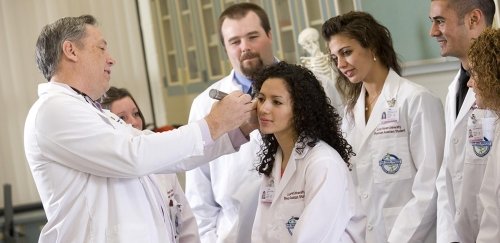
Physician Assistant
The nationally ranked Physician Assistant Program at Commonwealth University is designed based on the medical model that emphasizes basic sciences, clinical sciences, and the critical thinking skills required to complement physician practice.
- Degrees & Offerings
-
- M.H.S.
- Location
-
- Clearfield
- Lock Haven
- Department
- Program Contact
-
Chair, Department of Physician Associate Studies / Associate Professor
-
Program Director / Associate Professor, School of Graduate Studies
Program Details
- Program Delivery – Offered in Lock Haven, Clearfield, and Harrisburg. Each location includes a dedicated classroom with state-of-the-art academic technology to link the campus locations as well as anatomy labs, physical exam labs, and study space.
- Faculty – Core PA Program faculty are available onsite at all campus locations and consist of physicians, physician assistants, pharmacologists, and professors of basic human and social sciences from Lock Haven. Learn more about our program faculty.
- Service Opportunities – Available both locally and internationally. Recent international travel has included Jamaica, Costa Rica, and Honduras.
- Program Length – 24 months in duration. The first year (didactic phase) of the PA Program is primarily based in the classroom and lab settings while the second year (clinical phase) is primarily based in a variety of clinical settings. Courses are arranged so that foundational information is learned early and provides students with confidence and a strong basis for subsequent material. The total number of credits required for the PA Program (Didactic + Clinical Years) is 94.5.
- NCCPA Results and Attrition Data – Data regarding the Commonwealth University Physician Assistant Program’s results on the PA National Certifying Exam (PANCE) as well as class attrition data can be found on the NCCPA Results and Attrition Data page. You can review the Competencies for Entry-Level Practice here.
Admission Process
The Admissions Committee of Commonwealth University's Physician Assistant Program welcomes applications beginning in late April with each application cycle for the class to be seated the following May. Potential students should apply to the program through the Centralized Application Service for Physician Assistants (CASPA).
- Applications must be completed and verified by CASPA by November 1st. It is recommended that applicants submit their applications via CASPA by mid-October to allow adequate time for the application to be verified by CASPA.
- Candidates are eligible to apply if they will complete all prerequisite courses prior to the start of the program in May.
- Enrollment in the Physician Assistant Program is limited. Review the criteria students are evaluated on for admission into the program.
- When students are accepted into the program, they are asked to provide their preferred campus location ranking of the three campuses (Lock Haven, Clearfield or Harrisburg). If a seat is available at that campus, they will be placed at their preferred location. If not, they will be offered a seat at their next choice of campus pending seat availability. Each cohort consists of a set number of students — 36 students are accepted at the Lock Haven campus, 12 students are accepted at the Clearfield campus and 12 students are accepted at the Harrisburg campus.
Courses and Curriculum
The medical content in the didactic phase is designed around the most common problems encountered in primary care. The curriculum is presented in a modular format. Each module corresponds to a body system or medical specialty and contains information regarding: epidemiology, pathophysiology, physical diagnosis, clinical medicine, diagnostic procedures, anatomy, medical reasoning, unique needs of medically underserved populations, medical records/communications, pharmacology, non-pharmacological treatments, and medical research. Most modules include lecture, laboratory, and case-based learning components.
Summer semester (14.5 credits)
- Modular courses
- Service Learning Module (1 credit)
- Introductory Module (5 credits)
- Women's Health Module (1.5 credits)
- Urology & Sexually Transmitted Infection Module (0.5 credit)
- Human Sexuality Module (0.5 credit)
- Infectious Disease Module (2 credits)
- Non-modular course
- Gross Human Anatomy (4 credits)
Fall semester (19 credits)
- Modular courses
- Allergy & Immunology Module (1 credit)
- Hematology Module (1 credit)
- Ophthalmology Module (1 credit)
- Dermatology Module (1 credit)
- Endocrinology Module (1.5 credits)
- Cardiology Module (3 credits)
- Pulmonology Module (2 credits)
- Nephrology Module (1.5 credits)
- Neurology Module (2 credits)
- Psychiatry Module (2 credits)
- Non-modular course
- Underserved Populations (3 credits)
Spring semester (18 credits)
- Modular courses
- Oncology Module (1 credit)
- Pediatrics Module (2 credits)
- Orthopedics Module (1 credit)
- Rheumatology Module (1.5 credits)
- Gastroenterology Module (1.5 credits)
- Obstetrics Module (1.5 credits)
- Otorhinolaryngology Module (1 credit)
- Geriatrics Module (1 credit)
- Surgery Module (1.5 credits)
- Emergency Medicine Module (1.5 credits)
- Occupational Medicine Module (1 credit)
- Integrative, Complementary, and Alternative Medicine Module (0.5 credit)
- Non-modular course
- Medical Decisions (3 credits)
Notice: Students must earn at least a 3.0 cumulative grade point average in the above courses to successfully complete the didactic phase and transition to the clinical phase of the PA Program.
Clinical experiences in the second year emphasize primary care. Students gain depth and breadth of knowledge during nine clinical rotations. The rotations will have concentrations in the areas of pediatrics, women's health, family medicine, emergency medicine, general internal medicine, general surgery, and psychiatry/behavioral health. Each student will have either a second family medicine rotation or a second internal medicine.
Summer Semester (14 credits)
- Clinical Rotations I (13 credits)
- Evidence-Based Medicine I (1 credit)
Fall Semester (14 credits)
- Clinical Rotations II (13 credits)
- Evidence-Based Medicine II (1 credit)
Spring Semester (15 credits)
- Clinical Rotations III (14 credits)
- Evidence-Based Medicine III (1 credit)
- Students completing the PA Program curriculum will gain knowledge of medical conditions including anatomy and physiology, pathophysiology, clinical presentation, diagnostics, and treatments including pharmacology.
- Students will develop clinical skills including history taking and physical exam skills, suturing, splinting and casting, injections, venipuncture, etc.
- Upon completion of the program, graduates are eligible to sit for the Physician Assistant National Certifying Examination (PANCE).
Physician Assistant
Mission & Goals
The mission of the Physician Assistant Program is to educate and train highly-skilled Physician Assistants who:
- are capable of providing quality health care
- have expertise in the health care needs of the medically underserved
- are prepared to critically evaluate, and become leaders in bringing about improvement in the medical and social systems that affect the health of underserved populations
- will seek and retain employment as primary care Physician Assistants in medically underserved areas of the Commonwealth of Pennsylvania
Program Goal #1
Recruit a class each year with at least 50% of the students being from Pennsylvania and that demonstrates academic excellence in both their overall and science GPAs.
- Matriculated Students being from Pennsylvania:
- Measure/Benchmark: Percentage of matriculated students from PA per class is ≥ 50% of total number of matriculated students
- Rationale: Commonwealth University is a member of the Pennsylvania State System of Higher Education whose mission includes providing educational opportunities for Pennsylvania residents and serving the needs of the Commonwealth. Furthermore, the Commonwealth University PA Program’s mission focuses on the education of future PAs who are prepared to critically evaluate and provide high-quality healthcare that addresses the unique needs of medically underserved populations within the Commonwealth of Pennsylvania. Since graduates are likely to return to their home communities to serve as healthcare providers, the Program prioritizes recruitment of students from Pennsylvania in alignment with the Program mission.
Success of Goal:
Criteria Cohort 2024 Cohort 2025 Cohort 2026 Percent of students from PA 65% 83.3% 68.3% - Strength: for 3 consecutive years the Percentage of matriculated students from PA per class is ≥ 65% of total number of matriculated students.
- Weakness: below the benchmark for a period of 2 consecutive years
- Recruiting Students of Academic Excellence:
- Measure/Benchmark: Average undergraduate cumulative GPA of ≥ 3.3 for each matriculating cohort
- Rationale: The Commonwealth University PA Program recognizes that overall and science undergraduate GPAs are strong predictors of success in this academically demanding curriculum.
Success of Goal:
Criteria Cohort 2024 Cohort 2025 Cohort 2026 Average undergraduate cumulative GPA 3.63 3.74 3.68 - Strength: for 3 consecutive years the average undergraduate GPA of matriculated students > 3.5
- Weakness: below the benchmark for a period of 2 consecutive years
- Recruiting Students of Academic Excellence:
- Measure/Benchmark: Average undergraduate cumulative science GPA of ≥ 3.3 for each matriculating cohort
- Rationale: The Commonwealth University PA Program recognizes that overall and science undergraduate GPAs are strong predictors of success in this academically demanding curriculum.
Success of Goal:
Criteria Cohort 2024 Cohort 2025 Cohort 2026 Average undergraduate Science GPA 3.54 3.67 3.62 - Strength: for 3 consecutive years the average undergraduate science GPA of matriculated students > 3.5
- Weakness: below the benchmark for a period of 2 consecutive years
Program Goal #2
Provide every student with at least one clinical rotation that is in a rural and/or underserved area in preparation for potential future practice in these areas.
- Experienced a clinical rotation in a rural and/or underserved area:
- Measure/Benchmark: All students experiencing at least one clinical rotation in a rural or underserved area during the clinical year of the program.
- Rationale: The mission of the Commonwealth University PA Program focuses on the education of future healthcare providers who have expertise in the healthcare needs of medically underserved populations and are equipped to critically evaluate and become leaders who will bring about change in the medical and social systems that impact these populations. Furthermore, the PA Program seeks to promote the employment of graduates in underserved communities within the Commonwealth of Pennsylvania. The CU PA Program recognizes that clinical rotation experiences in these communities provide students with exposure to the unique needs of underserved populations and provide opportunities for professional development and future employment.
Success of Goal:
Criteria Cohort 2022 Cohort 2023 Cohort 2024 Percent of students with ≥ 1 rotation in an underserved or rural area 100% 100% 100% Percent of students with ≥ 2 rotations in an underserved or rural area 100% 100% 100% - Strength: for 3 consecutive years every student completes ≥ 2 rotations in a rural or underserved area during the clinical year of the program
- Weakness: below the benchmark for a period of 2 consecutive years
Program Goal #3
Prepare students for the practice of medicine as evidenced by a first-time PANCE pass rate that is equal to or greater than the national average.
- Rationale: The program recognizes graduate success on the PANCE is one marker used to demonstrate students have been provided a rigorous academic experience.
- Measure/Benchmark: Program first-time PANCE pass rate ≥ national average for the corresponding year
Success of Goal:
Class Class Grad Year Group Number of Candidates Who Took PANCE Number of Exam Attempts Number of Exams Passed Number of Exam Pass Rate National Exam Pass Rate for the Class Grad Year % of Candidates Who Ultimately Passed PANCE 2019 2019 First Time Takers 66 66 62 94% 93% 98% 2020 2020 First Time Takers 64 64 64 100% 95% 100% 2021 2021 First Time Takers 67 67 61 91% 93% 100% 2022 2022 First Time Takers 67 67 60 90% 92% 99% 2023 2023 First Time Takers 63 63 58 92% 92% 100% 2024 2024 First Time Takers 51 51 50 98% 92% 100% - Strength: for 3 consecutive years the annual first-time taker PANCE pass rates for the program are ≥ 2% higher than the national average first-time taker PANCE pass rates. We choose this level for strength as it demonstrates greater PANCE performance than the national average; if the national first-time taker PANCE pass rate is ≥ 92%, the program’s strength benchmark will be 94% first-time take PANCE pass rate.
- Weakness: below the benchmark for a period of 2 consecutive years
Program Policies
Commonwealth University of Pennsylvania's Physician Assistant Program Policies are designed to guide students, faculty and staff in order to maximize the student experience and promote academic success within the program.
- Please see the Degree Requirements effective Fall 2023. All enrolled students can also review their degree program requirements and track progress to degree completion in Degree Works.
- Candidates for the M.H.S. in Physician Assistant Studies must demonstrate technical abilities and skills in five areas outlined in the Technical Standards document.
- Students must maintain a 3.0 grade point average throughout the entire PA program, as well as the approval of the PA program faculty, to receive the Master of Health Science degree.
- Employment policies while enrolled in the program:
- The two-year PA program is concentrated and intense. The program discourages students from employment during either the didactic year or clinical year.
- Students who choose to be employed during the program must be aware that:
- Your job must never get in the way of your studies.
- Employment will never be considered as a valid excuse for those who have trouble coming to class, attending any functions, studying, taking tests or poor academic performance.
- The program’s lecture schedule and testing schedule can change without advance notification and students must stay flexible for changes.
- Employment will not be considered a valid excuse for failure to comply with program schedules in these areas.
- One part time graduate assistant is employed by the university at each campus location to assist with the technical needs of speakers in the classroom and to facilitate security of classroom equipment.
- Students are not required to perform clerical or administrative work for the program.
- During clinical experiences students are not to substitute for regular clinical or administrative staff.
Accreditation
At its March 2025 meeting, the Accreditation Review Commission on Education for the Physician Assistant, Inc. (ARC-PA) placed the Commonwealth University Physician Assistant Program sponsored by Commonwealth University on Accreditation-Probation status until its next review in March 2027.
Probation accreditation is a temporary accreditation status initially of not less than two years. However, that period may be extended by the ARC-PA for up to an additional two years if the ARC-PA finds that the program is making substantial progress toward meeting all applicable standards but requires additional time to come into full compliance. Probation accreditation status is granted, at the sole discretion of the ARC-PA, when a program holding an accreditation status of Accreditation - Provisional or Accreditation - Continued does not, in the judgment of the ARC-PA, meet the Standards or when the capability of the program to provide an acceptable educational experience for its students is threatened.
Once placed on probation, a program that fails to comply with accreditation requirements in a timely manner, as specified by the ARC-PA, may be scheduled for a focused site visit and is subject to having its accreditation withdrawn.
Specific questions regarding the Program and its plans should be directed to the Program Director and/or the appropriate institutional official(s).
The program’s accreditation history can be viewed on the ARC-PA website .
ONWARD and UPWARD

Program Costs
Our program offers a high quality, cost-effective educational experience for the next generation of Physician Assistants.

Our Campuses
At each of our campuses, our faculty deliver courses in technology-enhanced classrooms with vast multimedia capabilities, physical diagnosis labs, anatomy labs, and study spaces.

Become a Preceptor
Interested in becoming a preceptor? Contact us to discuss preceptor opportunities with Commonwealth University.
Program Faculty
Applying to Graduate Programs
Apply
-
Application Process
Review the step-by-step application process for graduate school at Commonwealth University.
-
Apply Now
By starting your application, you gain access to your personalized application portal to view your progress.
-
Contact Us
If you have questions, we have answers. Contact us today!
Explore More
-
Grad Assistantships
Help finance your grad degree. Gain professional experience. Grow your network.
-
Tuition and Fees
Earning an advanced degree is an investment in your future. See just how affordable a graduate degree can be for you.
-
Understanding Financial Aid
Our Financial Aid team is your guide to navigating the aid process for your graduate degree.


